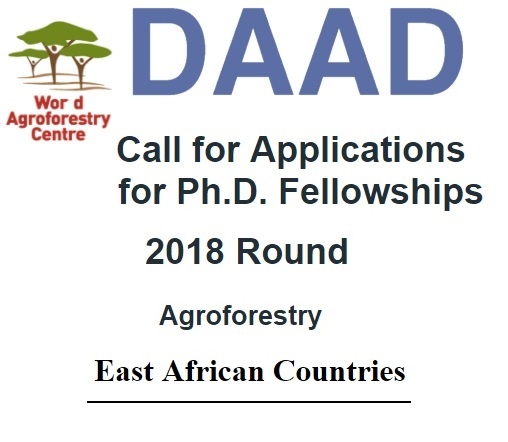Call for Applications for Ph.D. Fellowships under DAAD’s : for innovative research topics related to Forestry, Agroforestry & Agro Biodiversity (in East African countries)


Capacity Development (CapDev) has been an integral part of the World Agroforestry Centre’s (ICRAF) overall program to both facilitate the use and impact of its research as well as to enhance the relevance of its research and development for partners’ needs. Capacitating is one of four value propositions ICRAF offers to its clients in its new strategy to achieve the System Level Outcomes (SLO) of the Consultative Group on International Agricultural Research (CGIAR). ICRAF’s global Capacity Development Unit (CDU) at headquarters in Nairobi supports ICRAF staff to develop such capacities within its four Priority Themes in each of ICRAF’s six regional offices through Capacity Development Focal Persons. |
About DAAD Scholarships
The German Academic Exchange Service (DAAD), through its in-country/in-region fellowship initiative, is considering to fund Ph.D. Fellows who will conduct their Ph.D. studies in various aspects of agroforestry with ICRAF at its ongoing projects in East African offices (Ethiopia, Kenya, Rwanda, Uganda, Tanzania). More information about DAAD in-country/in-region scholarships.
ICRAF is thus inviting applications from qualified Ph.D. candidates for innovative research topics related to Forestry, Agroforestry and Agro biodiversity that influence development programs in East African countries related to its four priority research themes:
1. Climate, Environmental Services and Landscape Governance
2. Land Health Restoration and Investments
3. Trees for Resilient Livelihood Systems
4. Improved Tree Germplasm, Diversity, Products and Value Chains
The fellowships comprise a stipendium at DAAD approved rates varying for national/international scholars, medical and accidental insurances, hosting costs at ICRAF, university registration and tuition fee according to DAAD rates, and research costs (for pertinent details, see the attached document (Information Sheet for Scholars, 2018/2019).
The scholars will need to register at one of ICRAF’s partner universities at the location of the project and commit to complete their Ph.D. degree within 3 years from the date of start of the fellowship.
Qualifications:
- A completed Master’s degree in related field of study obtained in 2011 or later from an accredited academic institution with above average results;
- Full-time availability of the candidate for studies and research (part-time PhD candidates do not qualify for this call);
- A national of Sub-Saharan Africa;
- Proof of admission to the desired degree course or official letter assuring admission
- Excellent command of English language (demonstrated through a Master’s level thesis written and defended in English and/or IELTS/TOEFL scores or a proof of registration for one of these tests to be undertaken before May 31st, 2018)
Staff Members of Academic and/or Research Institutions are encouraged to apply but will be required to produce a letter of release / approved study leave from their respective institutions. Eligible female candidates, candidates from less privileged regions or groups as well as candidates with disabilities meeting required qualifications and conditions will receive preference.
Period of Fellowship :
Earliest: Sept 2018 – August 2021 (initially the fellowship will be awarded for one year which can be extended annually depending on the performance). The dates may vary depending upon the contractual arrangements between ICRAF and the student, or with the academic institutions where candidates are registered.
Application Procedure:
Interested candidates should apply electronically by email to i.ingumba@cgiar.org by 2nd February, 2018 (23:59 Nairobi time).
Please, visit this page for more information (the essential documents required for applications, the selection procedure etc.)
RELATED :

ARPPIS-DAAD PhD scholarships for study at icipe, Kenya : Three-year Doctoral Training in Insect and related sciences for development
Deadline for applications: 4 February 2018. FIND OUT MORE DETAILS HERE

